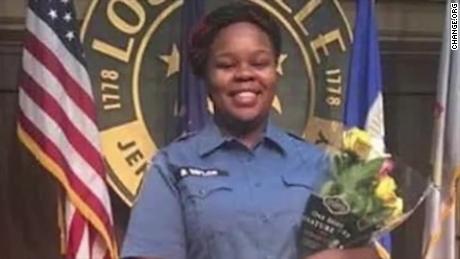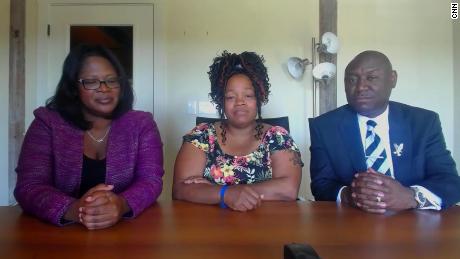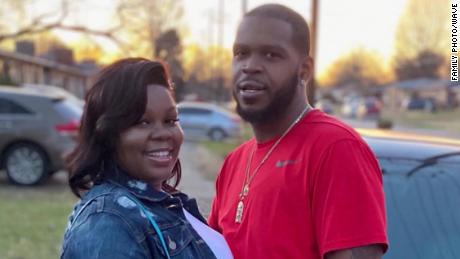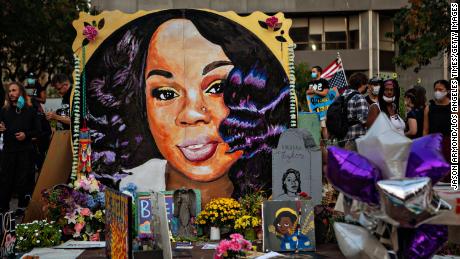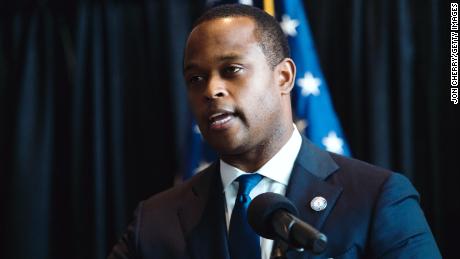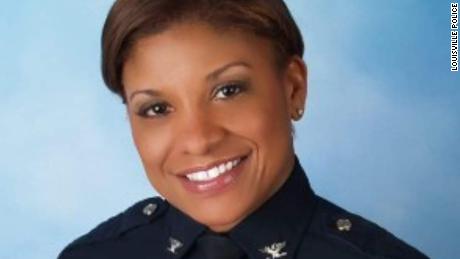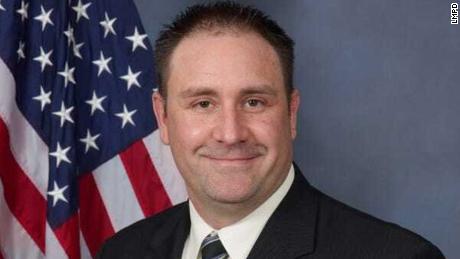(CNN)Nearly 15 hours of grand jury audio released in the Breonna Taylor case revealed conflicting accounts of what happened in the moments before Louisville police shot and killed the 26-year-old EMT and aspiring nurse in her home.
The officers involved in the failed drug raid in March told investigators they repeatedly knocked and announced themselves before bursting through her front door with a battering ram. They fired 32 rounds into the apartment after Taylor's boyfriend shot at them first, wounding one officer.
Her boyfriend, Kenneth Walker III, told investigators the people pounding on the door in the middle of the night did not respond when the couple yelled, "Who is it?," according to audio played before the grand jury. He believed intruders had broken down the door and he opened fire out of fear, according to Walker.
Beyond nationwide protests calling on people to "Say her name," Taylor's death has prompted cities across the country to move to ban or rein in no-knock, forcible-entry raids frequently used to serrve narcotics search warrants.
At the state level, Oregon and Florida have already banned the controversial police tactic.
"It's essential," Peter B. Kraska, a criminologist at Eastern Kentucky University who has studied police militarization since the late 1980s, said of the bans.
"There are jurisdictions all over the country on their own starting to pass legislation and work on legislation to ban no-knock and quick-knock warrants. It's a big deal."
Execution of warrants inherently dangerous
Raids such as the one in which Taylor was killed occur tens of thousands of times each year in the United States during the execution of narcotics warrants where officers rely on dynamic entries to disorient and confuse occupants, according to Kraska.
Forced entry raids became commonplace during the 1980s war on drugs and the growing use of special weapons and tactics teams in narcotics operations.
Increasingly, Kraska said, officers who are not part of special tactical teams -- like those in the raid that killed Taylor -- have been used to execute the warrants.
The raids, particularly when carried out in the middle of the night, are dangerous to civilians and law enforcement alike. In the Taylor case, in fact, an officer was shot and wounded, prompting the subsequent barrage of police bullets that resulted in her death.
And they're disproportionately carried out against people of color.
A 2014 American Civil Liberties Union report on police militarization found that 42 percent of SWAT team raids targeted Black people and 12 percent Hispanic.
A case highlighted in the report involved a Georgia SWAT team that threw a flash-bang grenade into a playpen, severely injuring a 1-year-old child who was placed into a medically induced coma.
"The decision to execute a search warrant at night, the decision not to wait for the occupants to open the door, the decision to use a battering ram -- all of these are unconstitutional if they are 'unreasonable,' but courts usually defer to police officers about what force is reasonable," Stanford law professor David Sklansky told the school's Legal Aggregate blog last month.
'Breonna's Law' spurred other legislation
Months before a Kentucky grand jury decided against indicting any officers in connection with Taylor's death, the case gained wider attention during nationwide demonstrations that followed the late May killing of George Floyd at the hands of Minneapolis Police.
In June, the Louisville Metro Council unanimously passed an ordinance called "Breonna's Law," banning no-knock search warrants.
The ordinance regulates how search warrants are carried out and mandates the use of body cameras during searches. All Louisville Metro Police Department officers are to be equipped with an operating body camera while carrying out a search.
The cameras have to be activated no later than five minutes prior to all searches and remain on for five minutes after.
All recorded data also has to be retained for five years following an executing action, according to the ordinance.
What other cities are doing
The Louisville ordinance has prompted similar moves throughout the country.
"They are small but important steps in the right direction," Sklansky told the Stanford Law School blog.
- Sen. Rand Paul of Kentucky, a Republican, has introduced a bill to ban no-knock warrants. The Justice for Breonna Taylor Act bans federal law enforcement officers from carrying out a warrant "until after the officer provides notice of his or her authority and purpose" and blocks state and local law enforcement agencies that receive Justice Department funding from carrying out warrants that do not require the officer involved "to provide notice of his or her authority and purpose before forcibly entering a premises."
- The mayor of Santa Fe, New Mexico, with the backing of the police department, last month proposed a ordinance to ban no-knock warrants, CNN affiliate KRQE reported. The bill requires all officers involved in executing search warrants to activate their body cameras.
- Tennessee State Sen. Raumesh Akbari is proposing legislation that would require law enforcement officers statewide to knock and identify themselves before entering a home, CNN affiliate WREG reported. The Memphis Police Department banned no-knock warrants in June, according to the station.
- The Indianapolis Metropolitan Police Department announced in July that it's no longer authorizing no-knock warrants, CNN affiliate WRTV reported. IMPD officers will not participate in the execution of such warrants, including when assisting other law enforcement agencies, according to the station.
- The San Antonio, Texas, City Council is considering a ban on no-knock warrants, CNN affiliate KSAT reported. Police Chief William McManus has said his department was putting final touches on a policy to allow no-knock warrants only in rare cases where "exigent circumstances (that) pose a serious threat to the safety of the officer or members of the public," according to the station. The department suspended its no-knock policy in June, McManus said.
Efforts must go beyond ban of no-knock warrants
Just after midnight on March 13, Louisville police officers armed with a no-knock warrant broke down the door to Taylor's apartment. The target of their investigation was her former boyfriend, who was allegedly involved in a drug trafficking ring.
The officers involved in the raid told investigators they announced themselves as police multiple times, according to recordings from the grand jury proceeding. But Taylor's new boyfriend, Walker, who was in the apartment, told police they kept asking who was knocking on the door and heard no response.
The grand jury decided last month to not indict any of the three officers directly involved in the raid in Taylor's death.
Former Det. Brett Hankison was indicted on three counts of wanton endangerment in the first degree for allegedly firing blindly into Taylor's apartment. He has pleaded not guilty.
Thor Eells, executive director of the National Tactical Officers Association, said no-knock entries should be a last resort for law enforcement but he cautioned against banning the tactic outright.
"The Breonna Taylor case, which is the catalyst for this movement to ban no knock, is the perfect case that supports what we're saying," he said.
Eells noted that ultimately the warrant was not served as a no-knock warrant.
"An argument could be made that had they served it as a no knock, they would have been able to get in quicker and get closer and confront Mr. Walker inside before he had a chance to arm himself and engage the police."
Kraska said the number of no-knock warrants executed by police SWAT teams has jumped from about 1,500 per years in the 1980s to about 45,000 in 2010. Such warrants are typically issued where a knock and announce police entry could lead to the destruction of evidence or compromise the safety of officers or others.
"State and local governments, due to their own problematic experiences with no-knock raids as well as the killing of Breonna Taylor, are moving swiftly to rein in and in some cases eliminate this dangerous and misguided police practice," he said.
But legislation to rein in no-knocks must also include quick-knock warrants -- when law enforcement knocks, announces their presence and breaks through the door, almost simultaneously, according to Kraska, who worked with Louisville officials in crafting Breonna's Law.
To be effective, Kraska said, the legislation should include full video surveillance of the operation, mandatory wait times before entry is forced, and the elimination of nighttime raids.
"It's not even near enough," he said of effort to ban no-knock warrants. "In fact, it would be one more exercise in symbolic politics where everybody gets to parade around and say, 'We passed Brianna's law' and nothing substantive changes."

